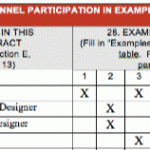Did you ever wonder what’s going on in the heads of the people evaluating your proposals? Today, you’ll get some insight into what it’s like being on the other side of the equation.
What is it really like to serve on selection committees? What secrets do these people hold? What are they not telling us?
People send me books all the time. I always read at least a portion of them. But I rarely, if ever, mention them on Help Everybody Every Day.
However, I must make an exception for Gary Coover’s “Secrets Of The Selection Committee”. You’ll want to run, not walk, to your nearest Amazon.com store and buy this book.
To give you a sense of this new book, Gary let me grill him in this candid interview.
Your book is called, ”Secrets of the Selection Committee.” Can you tell us a little bit about your history on selection committees. Were you on one, ten, or one hundred? What role(s) did you play?
I’ve served on probably 30-40 selection committees as a City Engineer and as a District Engineer for a large state special district, mostly for the selection of engineering consultants for large and small Capital Improvement Projects, either by SOQ or RFP.
Were there any experiences you had on selection committees that you found surprising?
Quite a few! The biggest surprise was how quickly submittals are reviewed, especially for the first cut. I was also surprised the first time we didn’t open any of the SOQ’s since we already knew all the firms who had submitted. Another surprise was finding out a prominent local firm was being deliberately excluded from all initial selection pools due to previous protesting by one of their principals.
From your perspective, is being on a selection committee difficult? Or is it pretty easy to make a choice?
It all depends on who and what is submitted. It’s difficult in that being on a selection committee takes precious time away from your other job duties, and you often have to spend that time slogging through a huge pile of seemingly impenetrably written proposals. If the people and firms in the proposal are already known to the committee members that really helps. And if there is a particular proposal that is clear and concise, that “gets it,” then that is a welcome relief.
Looking back, do you see the use of selection committees as a fair and democratic process? Were the cards stacked in some cases?
It’s usually pretty fair, everyone’s trying to find the best fit for the project at hand. But there were times an elected official would let it be known they were “very interested” in a particular firm getting selected.
I hope it’s changed by now, but years ago the City of Houston selection committees would only pick the top three and then submit the names to the Mayor’s office for the final selection – undoubtedly after he checked his list of campaign contributions!
In your experience, how much influence could a single person have on the committee?
Quite a lot, especially if that person is the end-user customer, or if they are a technical committee member who knows the most about the project requirements, or if they have specific experience (good or bad) with one of the submitting firms.
In general, how much time would you reasonably spend reading each proposal?
First pass? Sometimes less than a minute, maybe even a matter of seconds. Flip, flip, flip – if nothing jumps out or grabs our attention, it goes in the reject pile. Same thing if we saw something (or someone) that didn’t meet the basic qualifications or we didn’t trust them or want to work with them.
If there was no clear winner, once the field got narrowed down to the top three or four, we would go a little deeper and spend some time studying the approach, the makeup of the team, and the résumé of the PM and key staff. This maybe took 5-10 minutes. But rest assured we didn’t have time to read every single word.
During you time on selection committees did you see any shifts or trends in the proposals you reviewed?
The major trend I noticed was that some firms were beginning to really lean forward and submit some very specific client-centric proposals as opposed to the standard off-the-shelf generic bs. Some even went so far as to show conceptual designs and renderings of the very project they were proposing on. Sure, it’s a huge expense and a big gamble for them, but they justified it since they really wanted to win (and often did).
Knowing what you know now, what’s the single biggest thing people can do to ensure their proposal has the best shot with a selection committee?
Make it easy for them to pick you as the winner by clearly and concisely demonstrating trust, value and performance in writing that is exceptionably readable.
In the book, you say, “Sometimes It’s Just Not Your Turn.” What do you mean by that?
More true for local and municipal selections, they don’t want to give all the work to one firm no matter how good they are. There’s often an unwritten rule of needing to spread the work around so one firm doesn’t dominate the market. And they usually want at least two good firms to choose from – the competition will help keep everyone hungry which hopefully results in better work and better prices. In some cases they might not select a particular firm because they would be perfect for the next project coming up.
You mention that selection committees can easily see through your “BS.” What do you mean by that?
They’re looking for specific details, but when instead get claims like “we are leaders in ….” without any back up, then their credibility pretty much goes out the window. Over-the-top claims, mindless clichés, meaningless platitudes that give no real information are all a major turn-off for any reviewer. Makes you look like you’re all hot air and no substance.
Were there times when you thought you knew you wanted, but your minds were changed during the process?
Yes, many times. Someone on the committee might bring up an issue that the others weren’t aware of, everything from major problems on previous projects to concerns about the PM or about a firm’s workload and capacity. Or, conversely, a glowing recommendation from a committee member would help sway the result.
What are the mistakes people make when it comes to teaming with subconsultants?
There can be several mistakes, from way too many subconsultant team members (a cast of thousands), to not enough subconsultants (leaving huge gaps in the required experience), to not checking to see if the client has issues with any of the proposed team members. And if they don’t show a long successful track record with any of the subconsultants, that’s a huge red flag – you need to show proof you can all work well together.
If you have a question for Gary, please leave a comment and I’ll see if we can get them answered.






Matt, another great post! I just ordered the book and can’t wait to read it. Getting feedback from someone who has been on the other side of the interview table is really valuable. I can tell clients that their proposal material needs a major overhaul and they may nod politely and then point me back in the direction of their boilerplate. The information Gary provides, though, is the all important “3rd Party Endorsement” many of us need to convince firm leaders they really need to change their strategy when it comes to AEC proposals.
Is the book geared more for Government contracts or private?
Thank you for commenting. The author is coming from a government background.
I just clicked on the Amazon link and something weird is going on there. It says that for a MassMarket paperback version, it would be $605!!!
Hey Judy,
The paperback is much less. I’m not sure why there is a massmarket listing. Bottom line: check the other box.
Thanks Matt for sharing this resource. I have a question for Gary. In you interview you asked, “In general, how much time would you reasonably spend reading each proposal?” And Gary answered, “First pass? Sometimes less than a minute, maybe even a matter of seconds. Flip, flip, flip – if nothing jumps out or grabs our attention, it goes in the reject pile. Same thing if we saw something (or someone) that didn’t meet the basic qualifications or we didn’t trust them or want to work with them.” My question: What kinds of things would “… jump out or grab attention…” on a first flip through?
Bye now, on my way over to Amazon.
This is great information, Matt. I am going to order the book as soon as I finish up here.